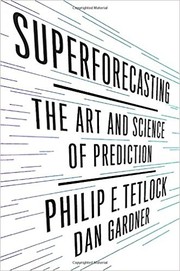Check nearby libraries
Buy this book

"From one of the world's most highly regarded social scientists, a transformative book on the habits of mind that lead to the best predictions Everyone would benefit from seeing further into the future, whether buying stocks, crafting policy, launching a new product, or simply planning the week's meals. Unfortunately, people tend to be terrible forecasters. As Wharton professor Philip Tetlock showed in a landmark 2005 study, even experts' predictions are only slightly better than chance. However, an important and underreported conclusion of that study was that some experts do have real foresight, and Tetlock has spent the past decade trying to figure out why. What makes some people so good? And can this talent be taught? In Superforecasting, Tetlock and coauthor Dan Gardner offer a masterwork on prediction, drawing on decades of research and the results of a massive, government-funded forecasting tournament.
The Good Judgment Project involves tens of thousands of ordinary people--including a Brooklyn filmmaker, a retired pipe installer, and a former ballroom dancer--who set out to forecast global events. Some of the volunteers have turned out to be astonishingly good. They've beaten other benchmarks, competitors, and prediction markets. They've even beaten the collective judgment of intelligence analysts with access to classified information. They are "superforecasters." In this groundbreaking and accessible book, Tetlock and Gardner show us how we can learn from this elite group. Weaving together stories of forecasting successes (the raid on Osama bin Laden's compound) and failures (the Bay of Pigs) and interviews with a range of high-level decision makers, from David Petraeus to Robert Rubin, they show that good forecasting doesn't require powerful computers or arcane methods.
It involves gathering evidence from a variety of sources, thinking probabilistically, working in teams, keeping score, and being willing to admit error and change course. Superforecasting offers the first demonstrably effective way to improve our ability to predict the future--whether in business, finance, politics, international affairs, or daily life--and is destined to become a modern classic"--
Check nearby libraries
Buy this book

Previews available in: English
Subjects
Economic forecasting, Forecasting, decision making, predictions, reasoning, analysis, psychology, SOCIAL SCIENCE / Future Studies, BUSINESS & ECONOMICS / Forecasting, PSYCHOLOGY / Cognitive Psychology, BUSINESS & ECONOMICS, SOCIAL SCIENCE, Future Studies, Cognitive Psychology, Techniques de prévision, Prévisions économiques, Scénarios, Psychologie sociale, Sciences cognitives, Society, Prognose, Methode, WirtschaftsentwicklungPeople
Daniel Kahneman, Barbra Mellers, Nassim TalibTimes
Early 21st centuryShowing 1 featured edition. View all 17 editions?
| Edition | Availability |
|---|---|
| 1 |
aaaa
|
Book Details
Classifications
Edition Identifiers
Work Identifiers
Source records
marc_openlibraries_sanfranciscopubliclibrary MARC recordamazon.com record
Library of Congress MARC record
Internet Archive item record
Internet Archive item record
Promise Item
marc_columbia MARC record
marc_nuls MARC record
harvard_bibliographic_metadata record
Work Description
Everyone would benefit from seeing further into the future, whether buying stocks, crafting policy, launching a new product, or simply planning the week’s meals. Unfortunately, people tend to be terrible forecasters. As Wharton professor Philip Tetlock showed in a landmark 2005 study, even experts’ predictions are only slightly better than chance. However, an important and underreported conclusion of that study was that some experts do have real foresight, and Tetlock has spent the past decade trying to figure out why. What makes some people so good? And can this talent be taught?
In Superforecasting, Tetlock and coauthor Dan Gardner offer a masterwork on prediction, drawing on decades of research and the results of a massive, government-funded forecasting tournament. The Good Judgment Project involves tens of thousands of ordinary people—including a Brooklyn filmmaker, a retired pipe installer, and a former ballroom dancer—who set out to forecast global events. Some of the volunteers have turned out to be astonishingly good. They’ve beaten other benchmarks, competitors, and prediction markets. They’ve even beaten the collective judgment of intelligence analysts with access to classified information. They are "superforecasters."
In this groundbreaking and accessible book, Tetlock and Gardner show us how we can learn from this elite group. Weaving together stories of forecasting successes (the raid on Osama bin Laden’s compound) and failures (the Bay of Pigs) and interviews with a range of high-level decision makers, from David Petraeus to Robert Rubin, they show that good forecasting doesn’t require powerful computers or arcane methods. It involves gathering evidence from a variety of sources, thinking probabilistically, working in teams, keeping score, and being willing to admit error and change course. Superforecasting offers the first demonstrably effective way to improve our ability to predict the future—whether in business, finance, politics, international affairs, or daily life—and is destined to become a modern classic.
Community Reviews (0)
History
- Created February 28, 2018
- 13 revisions
Wikipedia citation
×CloseCopy and paste this code into your Wikipedia page. Need help?
| May 22, 2025 | Edited by MARC Bot | import existing book |
| March 8, 2023 | Edited by MARC Bot | import existing book |
| January 14, 2023 | Edited by ImportBot | import existing book |
| January 4, 2023 | Edited by Mek | Merge works |
| February 28, 2018 | Created by benhathaway | Added new book. |









